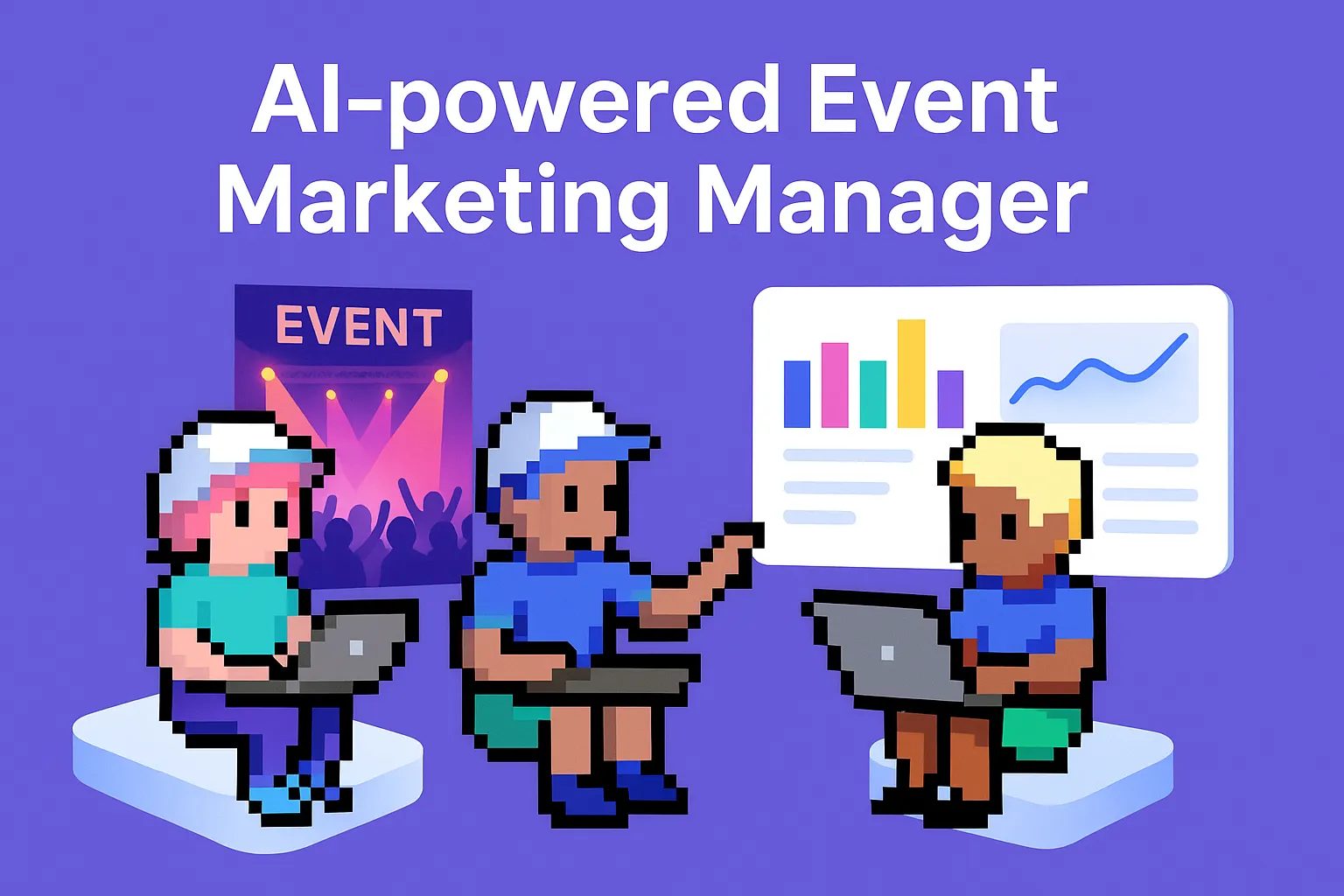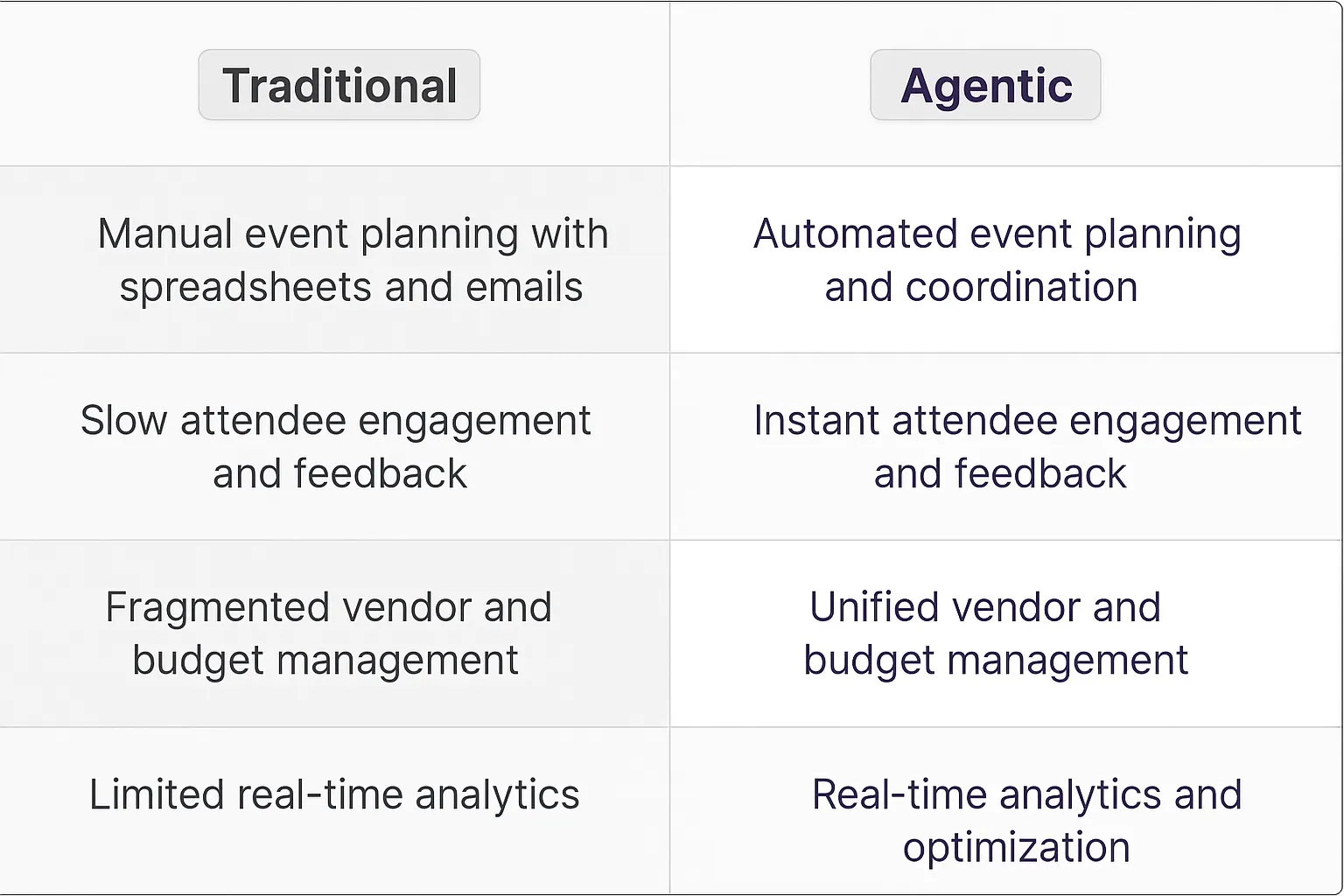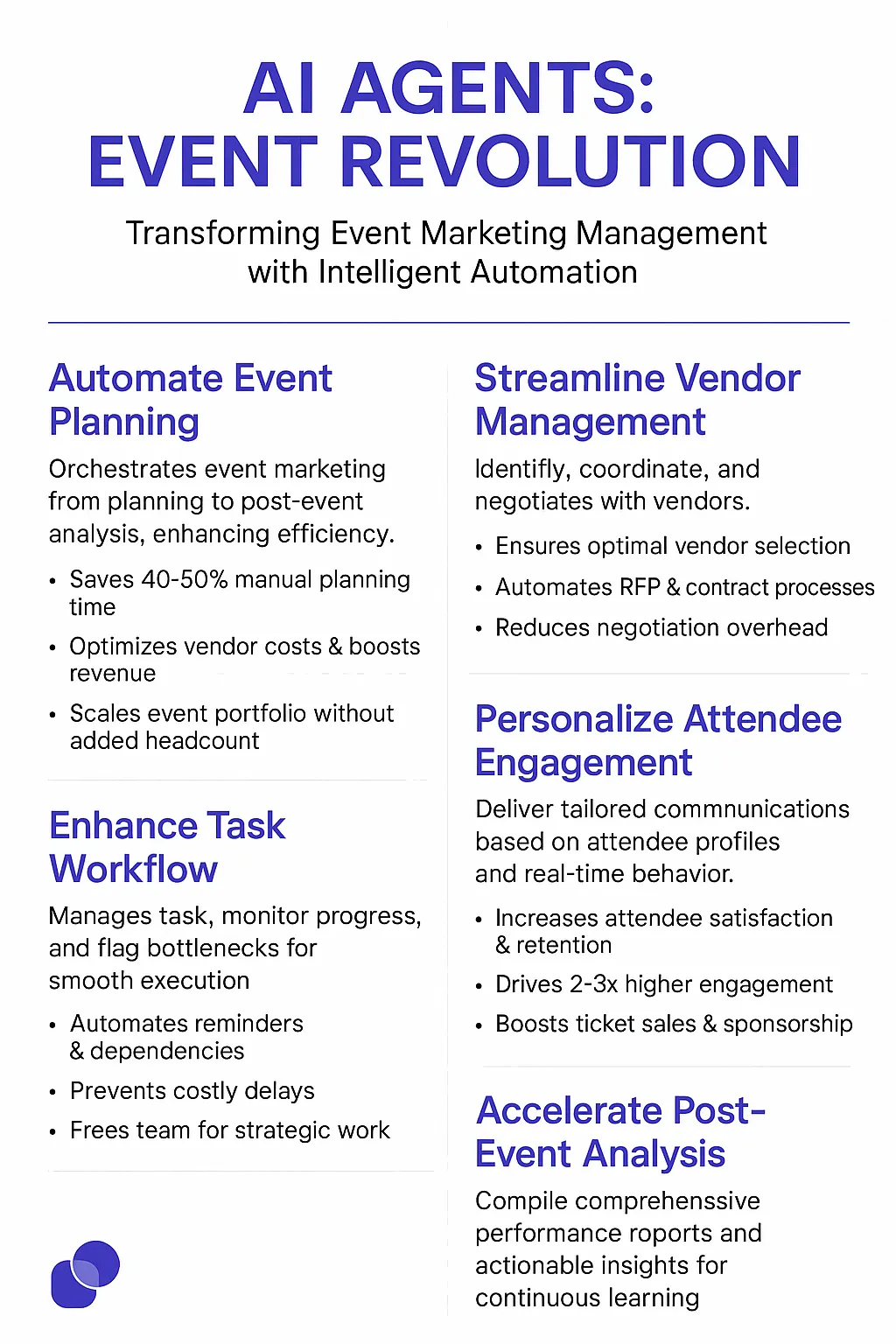Event marketers face an increasingly complex landscape where they must deliver personalized experiences at scale while managing tight budgets and timelines. AI agents are revolutionizing how event marketing professionals approach their work, automating time-consuming tasks and providing intelligent insights that drive better outcomes. These digital assistants can handle everything from initial event research and vendor coordination to real-time attendee engagement and comprehensive post-event analysis.
AI agents excel at processing vast amounts of data to identify optimal event opportunities, analyze competitor strategies, and predict attendee preferences. They can automatically generate personalized email campaigns, create social media content calendars, and even design promotional materials that align with brand guidelines. During events, AI agents can manage registration processes, answer attendee questions through chatbots, and track engagement metrics in real-time to help marketers make immediate adjustments to improve outcomes.
The most significant advantage of AI agents for event marketers is their ability to scale personalization efforts that would be impossible to manage manually. They can segment attendee lists based on behavior patterns, customize follow-up sequences for different prospect types, and continuously optimize marketing messages based on performance data. This level of automation allows event marketers to focus on high-level strategy and relationship building while ensuring that no lead falls through the cracks and every touchpoint is optimized for maximum impact.

Event marketers manage a diverse portfolio of responsibilities that span strategic planning, creative execution, and performance optimization. Understanding these core tasks is essential for building effective AI agent workflows that can support and enhance event marketing operations.
Event Strategy and Planning forms the foundation of successful event marketing. This involves researching target audiences, identifying optimal event formats and venues, developing comprehensive event timelines, and creating detailed project plans that coordinate multiple stakeholders. Event marketers must also conduct competitive analysis to understand industry trends and identify opportunities for differentiation.
Marketing Campaign Development and Execution encompasses the creation and deployment of multi-channel promotional campaigns. This includes developing compelling event messaging, creating email marketing sequences, managing social media promotion, designing marketing materials, and coordinating with PR teams for media coverage. The goal is to drive awareness and registration while building anticipation for the event experience.
Attendee Engagement and Experience Management focuses on creating meaningful interactions before, during, and after events. This involves managing registration processes, sending personalized communications, facilitating networking opportunities, coordinating speaker presentations, and ensuring smooth event logistics. The emphasis is on delivering value that exceeds attendee expectations.
Lead Generation and Nurturing represents the revenue-driving aspect of event marketing. This includes qualifying prospects, capturing lead information, scoring attendees based on engagement levels, and developing targeted follow-up campaigns. Event marketers must also coordinate with sales teams to ensure seamless handoffs and track conversion rates from event participation to closed deals.
Performance Analysis and Optimization involves measuring event success against predetermined KPIs and using insights to improve future events. This includes tracking attendance rates, engagement metrics, lead quality scores, ROI calculations, and attendee satisfaction surveys. The data collected informs strategic decisions about event formats, messaging, and resource allocation for maximum impact.

The evolution from traditional event marketing methods to AI-powered agentic approaches represents a fundamental shift in how marketing professionals plan, execute, and optimize their events. Understanding these differences highlights the transformative potential of AI agents in modern event marketing operations.
Traditional Event Marketing Approach relies heavily on manual processes and reactive decision-making. Event marketers typically spend weeks researching venues through phone calls and site visits, manually creating and sending email campaigns, and tracking RSVPs through spreadsheets. Post-event follow-up often involves generic email blasts sent days or weeks after the event, when leads have already gone cold. Performance analysis is limited to basic metrics like attendance numbers and requires significant time to compile and interpret data from multiple sources.
Agentic Event Marketing Approach leverages AI agents to automate routine tasks while providing intelligent insights for strategic decision-making. AI agents can instantly research and compare hundreds of venues based on specific criteria, automatically generate personalized email sequences that adapt based on recipient behavior, and provide real-time analytics during events to optimize engagement strategies. Post-event follow-up becomes immediate and highly personalized, with AI agents scoring leads and triggering appropriate nurturing sequences within hours of event conclusion.
The efficiency gains are substantial: where traditional approaches might require 40+ hours of manual work for event promotion and follow-up, agentic approaches can reduce this to 5-10 hours of strategic oversight while delivering superior personalization and timing. AI agents can process attendee data in real-time to identify high-value prospects, automatically schedule follow-up meetings, and even predict which attendees are most likely to convert based on engagement patterns.
Most importantly, agentic approaches enable event marketers to scale their expertise across multiple events simultaneously. While traditional methods limit marketers to managing 2-3 major events effectively, AI agents can support 10+ events with the same level of attention to detail and personalization, dramatically increasing the potential ROI of event marketing investments.

Modern event marketers rely on a sophisticated ecosystem of technology platforms to manage the complexity of contemporary event marketing. The integration of AI agents with these existing tools creates powerful synergies that amplify the effectiveness of each platform while reducing the manual effort required to coordinate between systems.
Event Management Platforms like Eventbrite, Cvent, and Hopin serve as the central hub for event logistics, registration management, and attendee communication. AI agents can integrate with these platforms to automatically update attendee information, trigger personalized communication sequences based on registration status, and analyze attendee behavior patterns to optimize future event planning decisions.
Marketing Automation Systems such as HubSpot, Marketo, and Pardot enable sophisticated lead nurturing and campaign management. When enhanced with AI agents, these platforms become even more powerful, automatically segmenting attendees based on engagement levels, personalizing follow-up sequences, and scoring leads in real-time to prioritize sales team outreach efforts.
Design and Content Creation Tools including Canva, Adobe Creative Suite, and Figma support the visual aspects of event marketing. AI agents can work within these platforms to generate branded marketing materials, create social media graphics at scale, and even develop presentation templates that maintain brand consistency across all event touchpoints.
Analytics and Reporting Platforms like Google Analytics, Salesforce Analytics, and specialized event ROI tools provide the data foundation for measuring event success. AI agents excel at synthesizing data from multiple sources, identifying trends and patterns that might be missed by manual analysis, and generating actionable insights that inform strategic decisions about future event investments.
The key advantage of an AI-enhanced technology stack is the seamless flow of information between platforms. AI agents can automatically update CRM records with event attendance data, trigger marketing automation sequences based on specific attendee behaviors, and generate comprehensive reports that combine data from multiple sources to provide a complete picture of event performance and ROI.
Effective measurement and optimization of event marketing performance requires a comprehensive approach that goes beyond simple attendance numbers to evaluate the full impact of events on business objectives. AI agents are transforming how event marketers collect, analyze, and act on performance data to continuously improve their results.
Key Performance Indicators (KPIs) for event marketing span multiple dimensions of success. Attendance metrics include registration rates, show-up rates, and session participation levels. Engagement metrics encompass social media interactions, booth visits, content downloads, and networking activity. Lead generation metrics track the number and quality of prospects captured, while conversion metrics measure how many event attendees progress through the sales funnel to become customers.
ROI Calculation Methodologies have evolved to capture both immediate and long-term value from event investments. Traditional approaches focused primarily on direct lead generation and immediate sales, but modern measurement includes brand awareness lift, customer lifetime value increases, and partnership opportunities generated through events. AI agents can track these complex attribution models automatically, connecting event participation to revenue outcomes that may occur months after the initial interaction.
Real-Time Performance Optimization becomes possible when AI agents continuously monitor event metrics and provide actionable insights during live events. They can identify which sessions are generating the most engagement, which promotional messages are driving the highest response rates, and which attendee segments are showing the strongest purchase intent. This enables event marketers to make immediate adjustments to maximize event impact.
Predictive Analytics and Forecasting represent the next frontier in event marketing measurement. AI agents can analyze historical event data, attendee behavior patterns, and market conditions to predict which events are likely to generate the highest ROI, which attendee segments to prioritize for future events, and what messaging strategies will resonate most effectively with target audiences.
The integration of AI agents into performance measurement creates a continuous improvement cycle where each event generates insights that enhance the effectiveness of future events, leading to compound improvements in ROI over time.
The event marketing profession is experiencing rapid evolution as digital transformation and AI adoption reshape industry expectations and career trajectories. Understanding the current landscape of skills, career paths, and professional development opportunities is essential for both aspiring and experienced event marketing professionals.
Essential Skills for Modern Event Marketers combine traditional marketing expertise with emerging technology competencies. Core marketing skills include strategic planning, campaign development, content creation, and performance analysis. Project management capabilities are crucial for coordinating complex events with multiple stakeholders and tight deadlines. Communication and relationship-building skills remain fundamental for vendor management, speaker coordination, and attendee engagement.
Emerging Technology Skills are becoming increasingly important as the industry embraces digital transformation. Proficiency with marketing automation platforms, CRM systems, and analytics tools is now expected. Understanding of AI and machine learning applications in marketing provides a competitive advantage, as does experience with virtual and hybrid event platforms. Data analysis skills are essential for interpreting complex performance metrics and making data-driven optimization decisions.
Career Progression Pathways typically begin with entry-level positions such as Marketing Assistant, progressing to Event Marketing Specialist, Senior Event Marketing Manager, and eventually Director of Events or VP of Marketing roles. Specialization opportunities exist in areas such as trade show marketing, corporate events, digital events, or industry-specific event marketing.
Professional Development Strategies include pursuing relevant certifications from organizations like the Events Industry Council or HubSpot Academy, attending industry conferences and networking events, and staying current with emerging technologies and best practices. Building a portfolio of successful events with measurable ROI outcomes is crucial for career advancement.
The Future of Event Marketing Careers will likely require greater comfort with AI tools and data analysis, as well as the ability to create seamless experiences across physical and digital touchpoints. Event marketers who can effectively leverage AI agents to scale their expertise and deliver personalized experiences at scale will have significant competitive advantages in the evolving job market.
The event marketing landscape is undergoing significant transformation driven by technological advancement, changing attendee expectations, and evolving business priorities. Understanding these trends is crucial for event marketers who want to stay ahead of the curve and deliver maximum value from their event investments.
Hybrid and Virtual Event Integration has moved from emergency pandemic response to permanent fixture in the event marketing toolkit. Modern attendees expect flexible participation options that accommodate their schedules and preferences. AI agents are particularly valuable in managing the complexity of hybrid events, automatically routing content to different audience segments, facilitating virtual networking, and ensuring consistent experiences across all participation modes.
Personalization at Scale represents a fundamental shift from one-size-fits-all event experiences to highly customized journeys for individual attendees. AI agents enable this level of personalization by analyzing attendee data to recommend relevant sessions, facilitate targeted networking connections, and deliver customized follow-up content based on specific interests and engagement patterns.
Sustainability and Corporate Responsibility are becoming central considerations in event planning and execution. Event marketers are increasingly focused on reducing environmental impact through digital-first approaches, sustainable venue selection, and waste reduction strategies. AI agents can optimize these efforts by analyzing the environmental impact of different event options and recommending more sustainable alternatives.
Data-Driven Decision Making is replacing intuition-based event planning with analytical approaches that optimize every aspect of event marketing. AI agents excel at processing vast amounts of attendee data, market research, and performance metrics to identify the most effective strategies for achieving specific business objectives.
Community Building and Long-Term Engagement extends the value of events beyond single interactions to ongoing relationship development. AI agents can maintain continuous engagement with event communities through personalized content delivery, automated networking facilitation, and targeted communication that keeps attendees connected between events.
These trends collectively point toward a future where event marketing becomes more strategic, data-driven, and technology-enabled, with AI agents playing a central role in delivering the personalized, measurable experiences that modern businesses and attendees demand.
The integration of AI agents into event marketing operations requires strategic planning and thoughtful implementation to maximize benefits while maintaining the human creativity and relationship-building that remain essential to successful events. Building an effective AI-powered event marketing team involves understanding where AI agents add the most value and how to structure workflows that leverage both artificial and human intelligence.
Strategic AI Agent Deployment begins with identifying the most time-intensive and repetitive tasks in your current event marketing processes. Lead qualification, email campaign management, data entry, and performance reporting are ideal starting points for AI agent implementation. These agents can work continuously to maintain consistent communication with prospects, update CRM systems with event data, and generate real-time performance insights that inform strategic decisions.
Human-AI Collaboration Models recognize that the most effective event marketing teams combine AI efficiency with human creativity and relationship management. While AI agents excel at data processing, personalization at scale, and routine task automation, human marketers remain essential for strategic planning, creative concept development, and high-touch relationship building with key stakeholders and VIP attendees.
Workflow Integration and Optimization requires careful consideration of how AI agents fit into existing processes and technology stacks. Successful implementation involves mapping current workflows, identifying automation opportunities, and gradually introducing AI agents in ways that enhance rather than disrupt established processes. This might begin with simple tasks like automated email responses and progress to more complex functions like predictive lead scoring and dynamic content personalization.
Performance Monitoring and Continuous Improvement ensures that AI agents deliver measurable value and continue to evolve with changing business needs. This involves establishing clear KPIs for AI agent performance, regularly reviewing and optimizing agent workflows, and staying current with new AI capabilities that could further enhance event marketing effectiveness.
Team Training and Change Management addresses the human side of AI adoption, ensuring that team members understand how to work effectively with AI agents and feel confident about their evolving roles. This includes training on AI tool usage, developing new skills that complement AI capabilities, and fostering a culture of continuous learning and adaptation.
The future of event marketing belongs to teams that can effectively orchestrate AI agents alongside human expertise to deliver exceptional experiences at scale while maintaining the personal touch that makes events memorable and impactful.